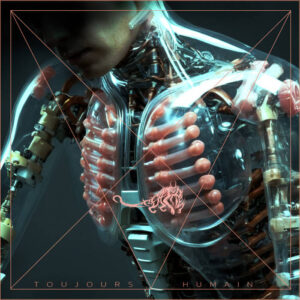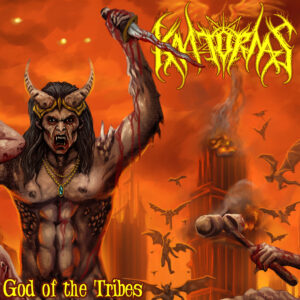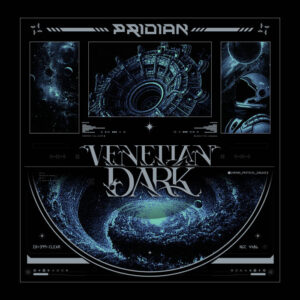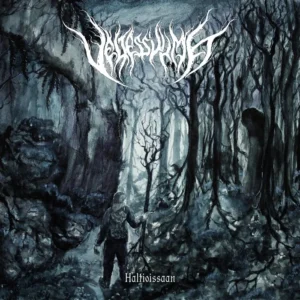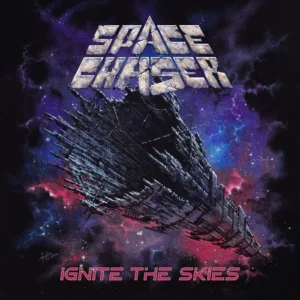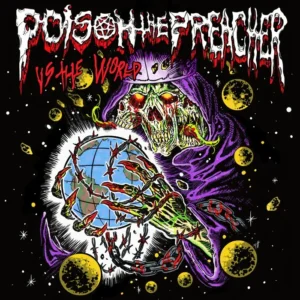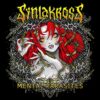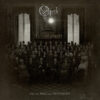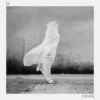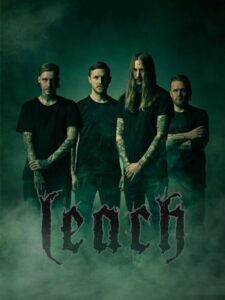The Loneliest Walk
Aphonic Threnody

APHONIC THRENODY is a funeral doom metal band with an international line up. Their members hail from across the world, including UK, Italy, and Chile. Doom is obviously no stranger to long songs/albums but "The Loneliest Walk," their fifth album, takes the proverbial cake. And everything else. With ten tracks and a whopping two hour and twenty three minute run time, this is by far the longest I've album I've reviewed. I will say that I'm a huge doom fan, with the genre being my favorite style of metal. Because I already have a mindset for this type of music, the run time didn't bother me. In fact, the runtime allowed me really dive into this album-this is the type of music that doesn't just hear pass through the ears but instead passes through the body and soul. On every level, this album fully enveloped me.
With that being said, people who don't like funeral doom, or doom in general, are more than likely not going to be able to handle this album. Not only for the length but just because of the breadth, scope, and density that is on display here. Because of this, this album feels very personal. The lyrics were written about Riccardo's personal trials, inspired by pain and trauma. So for that obvious reason, it is a personal album for the him. But it also feel like a love letter to the genre and for the fans...maybe even a thank you to us for sticking with the band. Riccardo is sharing who he is and what he has went through with us and presented it in a way that hardcore fans of this music will appreciate it. His cathartic approach to writing this album ends up being just what a funeral doom fan craves.
This album isn't just special for the subject matter or the scope in which it is presented. It also features the return of two APHONIC THRENODY alumni: Roberto Mura( Dea Marica, Urna) on vocals and Kostas Panagiotou (Panthiest, Towards Atlantis Light) on keyboards. Roberto's vocals make for an exciting performance that adds both an extra cloud of despair over the proceedings and a searing edge. His death growls are low, menacing, and compliment the weight of the music. His screams are blackened, razor sharp and gives the melancholic thunder much needed strikes of lighting. The music itself is cavernous but not just that. Many of the riffs remind me of old school Gothic doom, including the leads that lend their own sorrow to the mix. Kostas himself pains a dark but vivid picture of romantic doom art; his keys pain the very landscape and help make the album stand out from the rest of the releases this year. Although full integrated into the band's music, he gets two tracks to shine alongside Moha. The interludes, "Moonlight," and "To Tell A Story Of Darkness," are high end examples how to use instrumental music to fill in space between the story. These songs act as an excellent bridge yet stand firm on their own.
The album opener "Empathy," begins with an almost classical style build up: cello and keys add this artistic flavor to the bass and guitar that is so dark they are unto a void themselves, threatening to swallow up the song but always working in tandem with everything else. Riccardo once again shows he knows how to write a doom song without it becoming an obstacle to itself. It might be overly heavy, dark, and even disturbing but it is also part of the grand plan and wouldn't sound better any other way. The vocals are a slow crawl, just mustering up enough energy to lift themselves up enough to be considering barely alive. It has to be hard to play drums for a band that can be this slow but J.S. Decline pulls it off wonderfully. There just isn't any dull moments for the next nineteen minutes because every instrument and every person has the exact moment and spot they need within the song to make it work. The mid section is ambient like, what with the keys and cellos hanging like ghosts in the wind. It is certainly an introspective moment but it grabs the attention it needs to pull the listener through to the next part of the song which hits like a ton of bricks with more bricks on top of those bricks. Around the seventeen minute mark, the guitar tone gets deadly, the song hardly restraining itself at this point.
"The Sun Will Never Rise," is about has happy as one would expect but the music is so expertly put together that it unfurls outward like a cinematic experience more than a sludgy dirge. The flow of the song is among the best on the album, the song segueing into atmospheric parts from funeral doom movements and vice versa with apparent ease. The middle portion of the song, starting at about seven minutes in, is one of the heaviest moments I've heard this year in doom: suffocating darkness that doesn't let up even as you begin to drown in your own tears. The melodic part which follows is just....pure emotion on a scale that is hard to speak about. It is sad, it is funereal, yet it is real. It is life and all the bad that comes with it. The musical tapestry doesn't choose a side between good or evil..it just simply ripples outward and envelops all. The title track is depressing, even for a funeral doom song. At just over twenty-four minutes in length, it seems to stretch beyond the confides of these mortal shores and into a realm all of its own. Gothic flourishes accent the track, adding in a morbid embrace to wrap around the thick, chunky riffs. The keys around the eleven minute mark are dark but beautiful. They mix in with the heavier parts that come after so well that you don't really need to think about who is playing what...everything just sort of hits you at once yet still allowing full focus on individual elements. The contrast of the brutal death screams and the melodic bass is amazing and allows such emotionally devastating song to seem like it still has some semblance of life left inside, some small twinge of hope.
"To Mourn A Mother," is gentle yet violent. The beginning is pure landscape, built by light notes that are still intense in their own way. Around three minutes in, the whole band joins to create a funeral dirge that perpetually marches forward, much like death itself. The tempo picks up just every so slightly around the 6:37 mark, but it's more like running through mood rather than a full on sprint. The guitars and bass here are utterly sinister but it all leads back to more gentle yet brackish waters. The last few minutes of the song are a great representation of what this album is all about. And then we come to "Condemnation," which possibly the best song the band has ever one. The opening seconds are mysterious, smokey, and devoid of anything that doesn't make your nerves fried. The riffs slowly twist and turn down these charred hallways, being lead by the twisted vocals and solid drumming that knows how to accent the song as just the right moments, to keep stagnation away. I love how well the leads work with the riffs of this song-just free flowing yet smooth and pushes me to the next part while still remembering their original purpose. The keys are very subtle on this track but present just enough to make the band wonder a bit within the parameters of the song. The pressure of the drums seem to increase near the end, pushing melodic guitars to a place without a true ending-time itself has lost all meaning, there is only the present.
"These Four Walls," is riff based for the first few minutes and the bass is more than happy to supply the guitar with a low end that seems to be so heavy that it can be measured. The vocals seem to be grasping and move towards some unseen finish but the Gothic and melodic guitars get dragged with it-the whole song has a sense of foreboding and impending doom. The later half of the song is simple, ambient tones that leave you thinking about what you just hurt yet keep anticipation high for what comes next: a sweltering passage of punishment that sounds like eternal damnation "A Worthless Life," mixes clean tones with crushing metallic death. I like this idea because the clean tones still keep the mood and feel of the song intact-heavy without being actually heavy. But they also make you appreciate the doom more...which comes full circle because all the violent doom gives more meaning to the quiet parts, the space between. The riffs around the nine and half mark are tinged with just enough melody to add depth and growth-the song at this point does indeed seem to have a sentient aspect to it.
The last track is "The Beginning," and it the most immediate song on the album. It ignores build up and goes straight to the guitars. This song moves with a little more energy, helped in no small part by the drums and vocals. The music stalks and crushes its way to the eight minute mark where the distortion takes a step back for simple tones. Despite the seemingly quiet nature, these tones are still loud and as caustic as anything on the album-quiet doesn't have to be harmless and there isn't a genre that knows that better than doom metal. Ultimately, the heart and soul that was poured into this creation has come out the other side as defining master work of what doom metal is capable of. "The Loneliest Walk," may be a hard road to take but is what that is well worth taken. I imagine most people will experience their own version of this journey so check this album out and drive into it so that you may better face the darkness when it eventually finds out.
10 / 10
Masterpiece
Songwriting
Musicianship
Memorability
Production

"The Loneliest Walk" Track-listing:
Disc 1
1. Empathy
2. The Sun Will Never Rise
3. Interlude 1 - Moonlight
4. The Loneliest Walk
5. To Mourn A Mother
Disc 2
1. Condemnation
2. These Four Walls
3. Interlude 2 - To Tell A Story Of Darkness
4. A Worthless Life
5. The Beginning
Aphonic Threnody Lineup:
Riccardo V - Guitars, Bass
Justin Buller - Guitars
Roberto Mura - Vocals
Kostas Panagiotou - Keyboards, Piano
J.S. Decline - Drums, Guitar solos on tracks 1,2,4, &7
Moha - Cello, acoustic guitar
More results...
